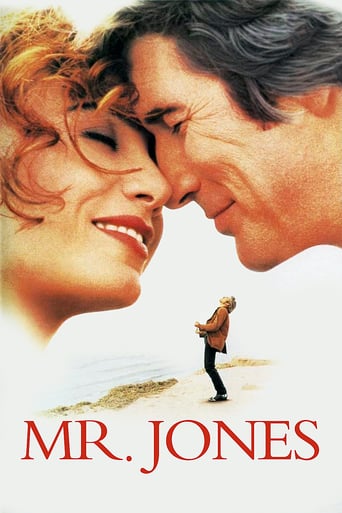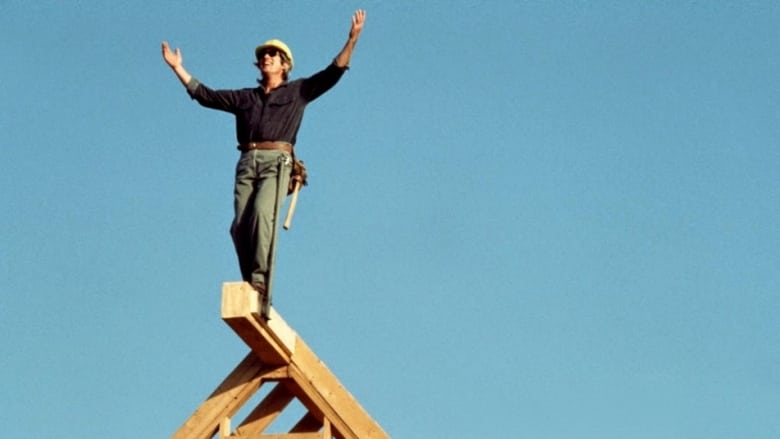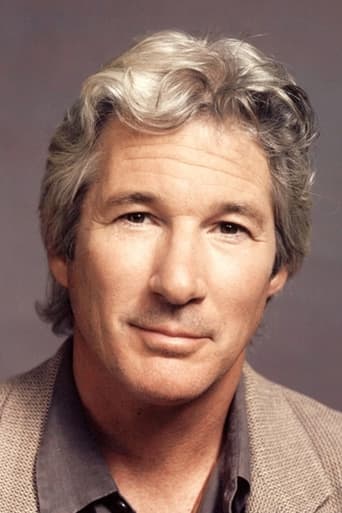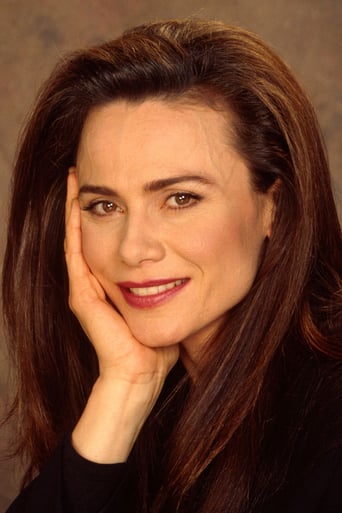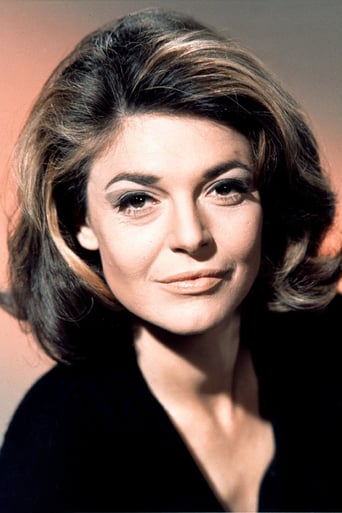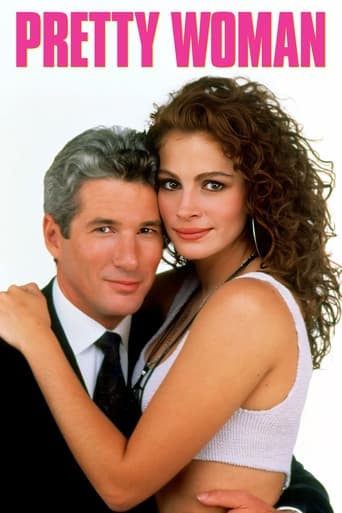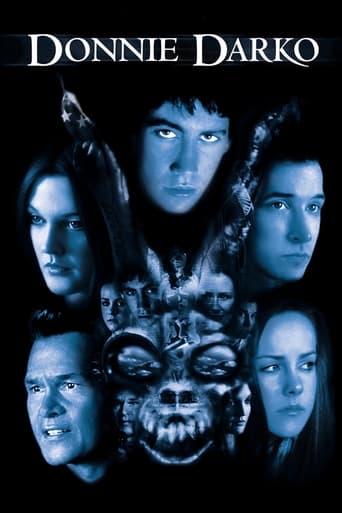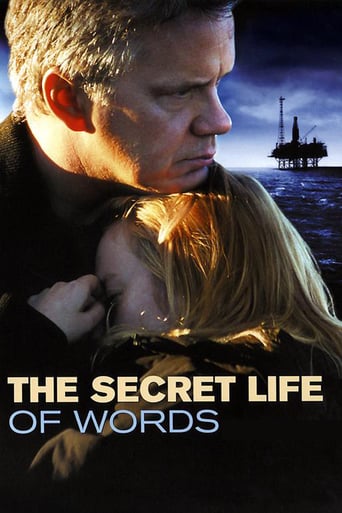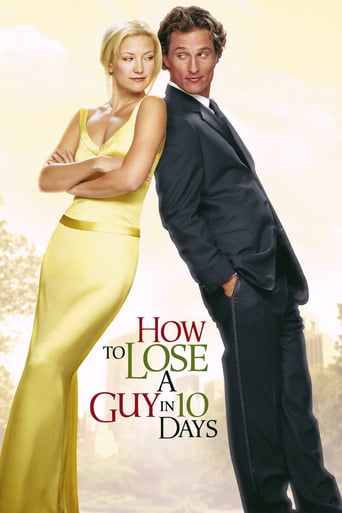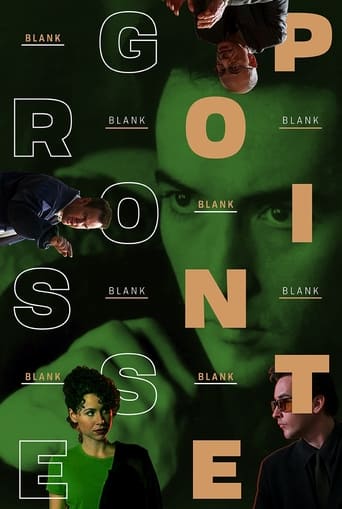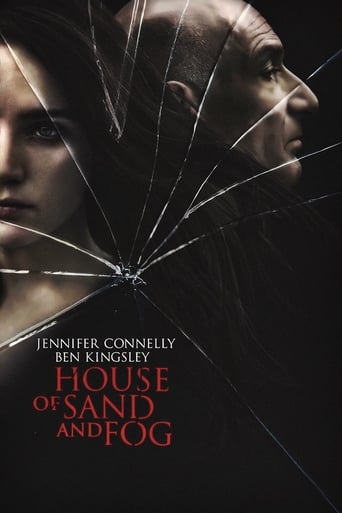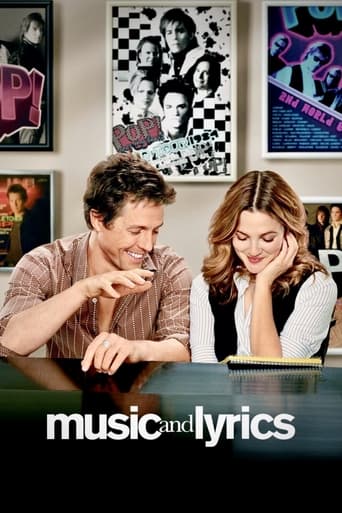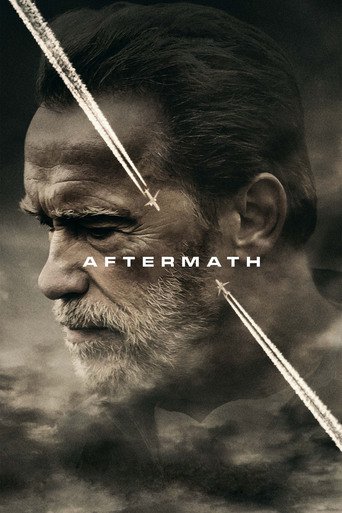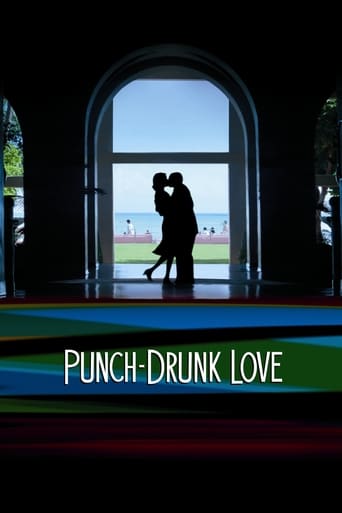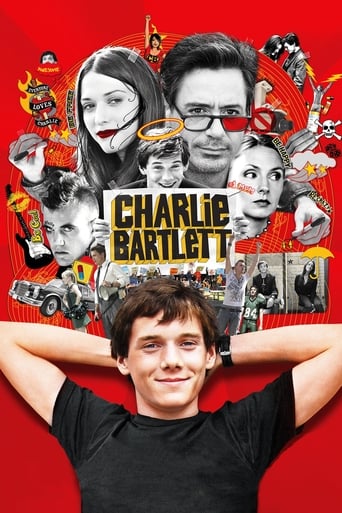Mr. Jones (1993)
The story about the relationship between a manic depressive man, Mr Jones, and the female doctor who takes more than a professional interest in his treatment.
Watch Trailer
Cast


Similar titles
Reviews
1993 was probably the best year for Best Male Performances in Leading Roles from the 90's decade. The actual Oscar nominees in that category were Daniel Day-Lewis in "In The Name of the Father" (he should have won); Liam Neeson in "Schindler's List" & Anthony Hopkins in "The Remains of the Day" with Laurence Fishburne in "What's Love Got to Do with It" as a token nomination and the actual winner, Tom Hanks in a "just staring at the court and looking sick and hopeless" performance in "Philadelphia" that earned him several awards and critical praise much because of the subject matter than the passable performance itself. Out of this line-up there were 5 strong performances that deserved to be nominated as well: Kevin Costner in "A Perfect World"; Michael Douglas in "Falling Down"; Brad Pitt in "Kalifornia"; David Thewlis in "Naked" and Richard Gere in "Mr. Jones". Now, the Academy never respected established manly lead actors, which were also sex symbols, that came from the 80's decade, with the exception of Douglas that deservedly won for his magnificent Gordon Gekko portrayal in "Wall Street" ('87), but Costner and Gere were seen as just pretty faces and bankable stars and not Oscar material in terms of their acting. Well... they were all wrong !!"Mr. Jones" reunites Richard Gere with director Mike Figgis who directed him in one of his best performances, the dirty cop Dennis Peck in "Internal Affairs" ('90), and his portrayal of a man suffering from bipolar disorder is nothing less than astonishing & committed to the role, treating his character with empathy, dignity and respect that the ones who, sadly, suffers from this disease truly deserve.Gere is at his attractive best here, he's charming and contagious, his own world makes him one of a kind and generates affection with every person he meets, from the foreman, played by Bill Pullman in an unbilled role as a favor to Richard Gere after they work together in "Sommersby" the same year; his construction worker colleague, Howard, played by Delroy Lindo who offers a great supporting turn; the doctor of the psychiatric hospital, Elizabeth "Libbie" Bowen, played by Lena Olin, a last minute replacement for the part after Michelle Pfeiffer quit the movie to do "Batman Returns" and even Cindy Crawford, who was married to Gere at the time, in an unspoken cameo as a passer-by. Veteran lady Anne Bancroft is always welcome to this kind of role, providing a mentor figure to the doctors in the ward, but her role is very small and ultimately, plotwise pointless.The movie flows at a nice pace and Gere dominates every scene he's in, some could argue that the screenplay could have been developed better and without the stereotyped love story of the "doctor falls for the patient", but the movie works fine this way, and even if true love and genuine care can't cure the bipolar disorder, at least it helps the ones who are suffering from it to find their North Star.In short, "Mr. Jones" is a must-see for lovers of romantic drama films and for the people who want to know more about the Manic Depressive Disorder, its symptoms and the causes that lead to a suicidal depression state.Kudos to the director Mike Figgis; the screenwriter Eric Roth and the executive producer and lead star Richard Gere for their effective insight into this pathology.
Honestly, this is the best movie of all time that Richard Grere stars in. Not because I dislike his acting or his movies - but purely because he was spot-on perfect.I cant imagine a single other actor who could have portrayed a Bi-polar person perfectly. and he did - I have Bi-polar and I know from experience how hard it can be, especially because it is truly like being on drugs, like he said- "I need the highs" It was also amazing that they added in the anger along with the depression - not all manic stages are crazy, euphoric highs, sometimes they are also combined with irrational anger, which was definitely portrayed well in Mr. Jones' ping-pong match, and in the end, when he goes to visit his old construction friend.Yes, the romance was very unrealistic, but it added a chance for a happy ending - Mr. Jones isn't by any means 'cured' but there is someone who understands him and his disorder, someone who is willing to help him in his highs and lows and knows how dangerous he can be.I definitely give this movie a 10, I love it.
I find it interesting that films are so often chastised for being "unrealistic," when realism is usually neither an attainable nor desirable goal in a film (for example, most films don't portray a story that unfolds within two hours or less, so montages or other devices are used). The main purpose of Mr. Jones (the film) is to tell the story of a man with bipolar disorder, and issues of "realism," for me, are then based on two questions. Firstly, did the film, and Richard Gere in particular, accurately portray the experiences of a person with bipolar disorder? Secondly, was his experience with mental heath care also fairly portrayed? As someone who has suffered from bipolar disorder for almost ten years, I can unequivocally say that the answer to both questions is yes. This film gives the best portrayal I have yet to see of the experiences of suffering from and being treated for bipolar disorder.From the early scene where Mr. Jones is seen trying desperately to get a job, to the ending sequence where he tries to fly for the nth time over and gives up, Gere gives an outstanding and thoroughly believable performance of a man living with the intensity of bipolar disorder. Most poignant to me were the moments when he was able to realize just how much he was fooling himself about the disease, yet couldn't break away from it. In a lesser movie, the line "I'm an addict" would be a sarcastic reference to his medication; here, it is used as a perfect description of Jones' need for his manic highs.In addition, I have yet to see as understanding a cinematic portrayal of mental health care in the United States. Even upon viewing it fifteen years later, this film deals so accurately with so many mental health care issues - the "revolving door" aspect of treating patients in current-day America, the moments of joy and pain one can experience even within a hospital (without the overdone dramatics of most films taking place in mental hospitals), and the efforts and sacrifices that doctors and staff make every day. Indeed, one of the most striking aspects of the film has to be the ease with which Gere walks in and out of treatment, a truly realistic situation, even more realistic because he has apparently been doing so for many years. The reality, despite what films would normally have us believe, is that it is much more likely in America today to be trapped in a "revolving door" for many years, never getting the treatment one really needs, than to be "wrongfully institutionalized" for many years. Unfortunately for "realism," the latter makes for much better high drama.Speaking of high drama, let me turn to two slightly controversial aspects of the film: the love story aspect, and the ending. Personally, I don't find it "unrealistic" that Jones' doctor could fall in love with him - it certainly happens in real-life patient-doctor relationships, and it makes for an interesting twist. Others have criticized this part of the story as unnecessary, but I see no particular reason for its omission, because the film did give plenty of screen time to the story of Jones' disease and there was room for this extra plot angle. In addition, her responses to the developing relationship and her resignation were handled excellently and accurately - there was no deux ex machina that allowed her to stay at the hospital or keep treating him - and also allowed for a look at some of the ethical issues involved in mental heath care. My only issue with the love story was that it was a bit clichéd, but it didn't detract from the film much at all in my opinion.As for the ending, a lot of people have had trouble with the fact that Jones either seems to be "cured" too easily, or that there was no climax where he actually fell off the house, or that in general it was too "neatly wrapped up." I would have to say that, knowing the bipolar disorder condition so personally, the ending was perfect. For sufferers of bipolar disorder, it can be so easy and quick to move from one mood to another, and the arrival of a loved one can easily "snap you out" of dangerous situations. The message that I took from the ending was not that he was "cured," or that he wasn't (there is no "cure" for bipolar disorder at this point). It was simply that he had faced another tough day as a sufferer of a disease, and that he now had a lover who was going to help him face more tough days. The end dialogue is particularly telling. His last line: "So now what?" Hers: "A cup of coffee. Decaf." They are moving on. Our view into their lives is over, but they will be fighting the battle for years to come. The rest of the movie has already told us that. A lesser script would have had some sort of "and then life became great" montage, which would have ruined this film. Here we are left with the understanding that the fight against the disease goes on, but that he now has someone who will aid in the fight and temper his moods as best she can, starting with sticking to decaf (which is more than just a joke if you have bipolar disorder).If you don't mind a fairly standard Hollywood love story as part of the mix, you will find this an outstanding, moving, and educational film. I give it 9 out of 10 only because the love story goes on just a tad too long, and that time could have been used for more exploration of the illness and its treatment.
The most poignant point in this movie, for me, was not whether doctors should have relationships with patients (of course we know this happens, we know it is wrong, we know it doesn't usually happen, and we should all be horrified at the thought), it was not that people who have bipolar are people, too, and it was not how well Gere portrayed his character.It was the fact that his character was unwilling to take his meds because his euphoric highs were what made his depressive lows tolerable, and even worth it. And those euphoric highs were amazing, a huge bite into life that many of us only wish we were brazen enough to chew. But, of course, his illness prevents the wise knowledge of how high to go.Imagine this yo-yo approach to life - for a lifetime - I can't. Next, imagine someone suffering the lows to the same degree Gere's character suffered the highs. Suicide, anyone? This movie slams home the emotional roller coaster which courts of law and some medical establishments are incapable of approaching correctly.I wonder if locking Mr. Jones up for grand theft would have been a good thing - nah, not really, c'mon think about it. As for the unprofessional behavior of the doctor - well, I guess she fell in love. Shame on her. Of course, she should have withdrawn from his case. I wonder who would have been in charge of his treatment, and what treatment he would have received. D'oh, this was her major concern, for this particular storyline. The doctor who would have taken over was quite undesirable.Although most medical facilities are professionally compassionate regarding the illness, this movie used a plot with an antagonist - necessary for a climactic story, but seldom available in real life. It's just to remind us that sometimes exceptions can be allowed and punishments waived for human errors. I never got the impression that this movie was encouraging unprofessional behavior.

